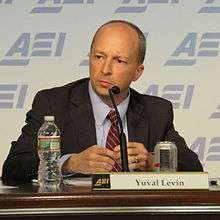Yuval Levin
| Yuval Levin | |
|---|---|
 | |
| Born |
1977 (age 40–41) Haifa, Israel |
| Education |
American University (BA) University of Chicago (MA, PhD) |
| Notable work | The Great Debate: Edmund Burke, Thomas Paine, and the Birth of Left and Right (2013) |
Yuval Levin is an American political analyst, public intellectual, academic, and journalist. He is the founding editor of National Affairs, vice president and Hertog Fellow of Ethics and Public Policy Center. He is a contributing editor of National Review and The Weekly Standard, a senior editor of The New Atlantis. His essays and articles have appeared in numerous publications including the New York Times, the Washington Post, the Wall Street Journal, Commentary, and others. Levin is the author of four books.
Early life and education
Levin was born in Haifa, Israel, and moved to the United States with his family at the age of eight.[1] He earned a bachelor's degree in political science at American University, and earned a PhD from the Committee on Social Thought at the University of Chicago.
Career
Levin is the founding editor of National Affairs. He is also a fellow at the Ethics and Public Policy Center, a conservative think tank in Washington, D. C. In 2005 and 2006, he was a member of the White House domestic policy staff. He is the former chief of staff of the President's Council on Bioethics, a former Congressional staffer, contributing editor to National Review and the Weekly Standard, and one of the founders of The New Atlantis, where he still remains as a Senior Editor.
Levin is the author of four books, and of numerous essays and articles dealing largely with political theory, science, technology, and public policy. On the relationship between political theory and public policy, Levin has said:
For me, these things are very deeply connected. I think politics really is rooted in political philosophy, is much better understood when it's understood in light of political philosophy. And that a lot of the policy debates we have make much more sense if you see that people are arguing about two ways of understanding what the human person is, what human society is, and especially what the liberal society is. The left and right in our country are both liberal, they both believe in the free society, but they mean something very different by that.[2]
Conservatism, Levin has said, "understands society not as just individuals and government, but thinks of it in terms of everything that happens in between. That huge space between the individual and the state is where society actually is. And that's where families are, it's where communities are, it's where the market economy is." [3]
Levin has been called "probably the most influential conservative intellectual of the Obama era",[4] while The New Republic has dubbed Levin "the right's new Irving Kristol".[1]
Works
- Levin, Yuval (2001). Tyranny of Reason: The Origins and Consequences of the Social Scientific Outlook. Lanham, Maryland: University Press of America. ISBN 9780761818724. OCLC 45087346.
- Levin, Yuval (2008). Imagining the Future: Science and American Democracy. New York: Encounter Books. ISBN 9781594033308. OCLC 503444967.
- Yuval, Levin (2014). The Great Debate: Edmund Burke, Thomas Paine, and the Birth of Right and Left. New York: Basic Books. ISBN 9780465050970. OCLC 858672374.
- Yuval, Levin (2016). The Fractured Republic: Renewing America's Social Contract in the Age of Individualism. New York: Basic Books. ISBN 9780465061969. OCLC 945121355.
References
- 1 2 Tracy, Mark (March 25, 2013). "Baby Kristol". The New Republic. Retrieved February 9, 2017.
- ↑ Levin, Yuval. "Conversations with Bill Kristol". Conversations with Bill Kristol. Retrieved 1 October 2014.
- ↑ Levin, Yuval. "Conversations with Bill Kristol (transcript)". Conversations with Bill Kristol. Retrieved 1 October 2014.
- ↑ Chait, Jonathan. "The Facts Are In and Paul Ryan Is Wrong". New York. Retrieved 10 May 2013.